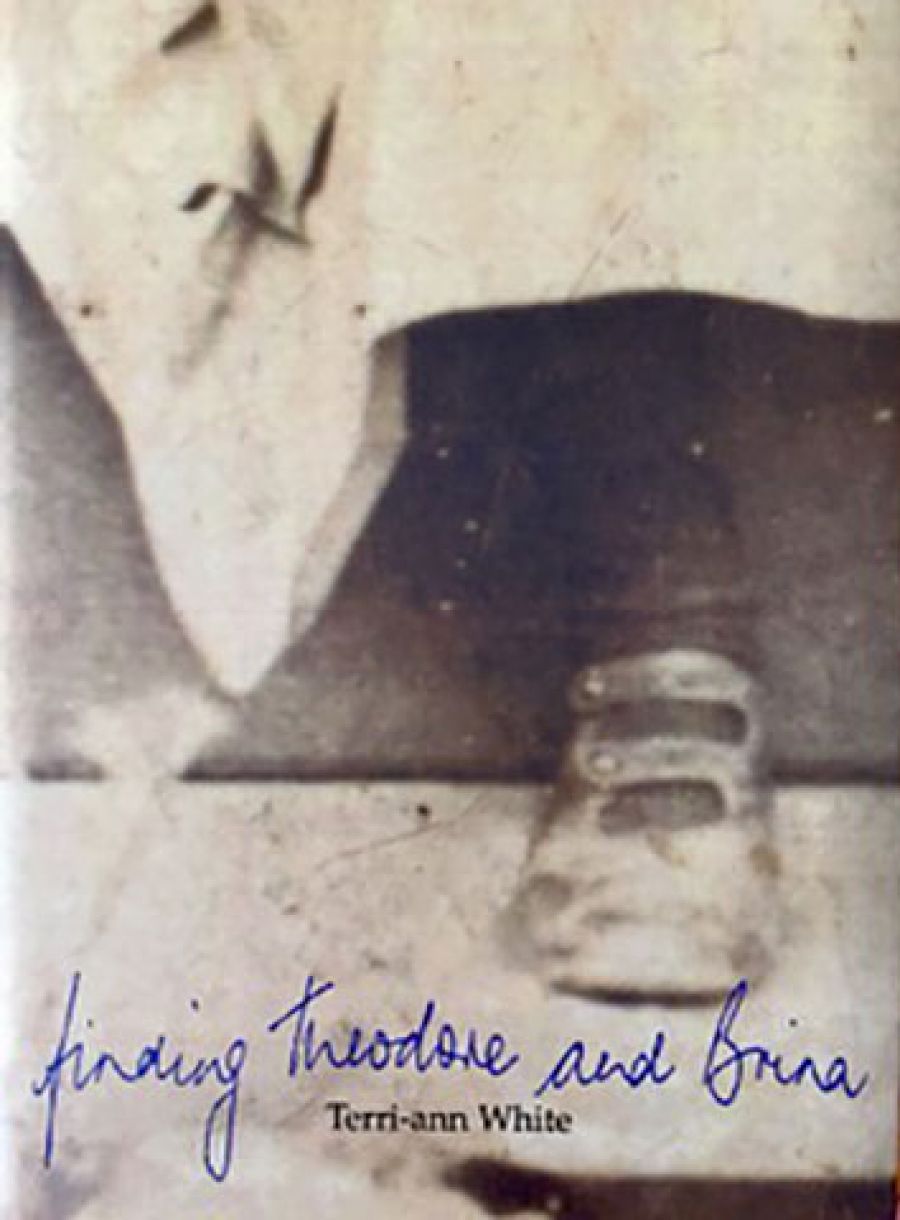
- Free Article: No
- Contents Category: Fiction
- Review Article: Yes
- Online Only: No
- Custom Highlight Text:
This is the tale of a quest driven by an obsession. At its heart are the Krakouers, an Australian family of five generations. The author is a descendant of the first Krakouers to settle in Western Australia. Terri-Ann White’s project is to record the gaps and silences, to piece together fragments, and ‘rescue’ family members ‘from obscurity’.
- Book 1 Title: Finding Theodore and Brina
- Book 1 Biblio: FACP, $19.95 pb, 240 pp
White’s quest begins in Perth, and moves between past and present with great skill. In the course of her journey, she uncovers a succession of taboos and transgressions sprinkled throughout the generations. There are women who bear illegitimate children, and a cousin who pays the highest price for this ‘shame’ and dies in childbirth. There are taboos of ‘convictism’, disease and madness, and the shame of Judaism in a Christian community. And there is one taboo that, says White, ‘eclipses’ all the others. White uses the pejorative term ‘miscegenation’. She writes:
Sons of a Jewish convict make their way warily in this colony, and following the practices of the day have sexual relations with Nyoongar women. Such contact with indigenous women is well documented as a regular pastime of settler men in the colony, although still rarely discussed. Official documents cannot record the nature of these relations: whether or not they involved love or affection, whether they were a perverse manifestation of the desire for assimilation, part of the national project of addressing the problem of the ‘coloured minority’, or whether the sexual congress could be named as rape.
The Krakouer name has been made famous in recent years through the deeds of Aboriginal footballers. White works her way back through the generations and finally recounts the tale of the first Krakouers to arrive in Australia, her grandmother’s grandfather, Theodore Krakouer, and his wife, Brina. Theodore was born in the Polish city of Krakow. The name Krakouer means ‘of Krakow’. Theodore studied in Berlin before migrating to London. Convicted and transported for stealing fine fabrics and laces, he arrived in Perth, then called the Swan River Colony, in 1851. Brina Israel and her sixteen-year-old sister Esther arrived in the colony from London in 1853: ‘She was an unmarried emigrant woman on supported passage to a colony that wanted domestic servants and wives for its male population.’ Between 1853 and 1869, Theodore and Brina bear nine children in Fremantle. The eldest son, Abraham, is recorded as the first Jew born in the colony. Yet the Krakouers quickly assimilate. All their children marry gentiles, and none of the children will consider themselves to be Jewish.
White enters into the depths of family history. To accomplish this complex task she employs many devices: she sifts through archives, locked boxes, decaying letters, and the records of births, deaths and property transactions; she undertakes journeys that follow in the footsteps of her fore-bears; and she is forced to explore ‘something more illusive, the hushed over space of mistakes and shameful wrong turns; lost items, including the lives of individuals not deemed interesting enough to preserve’.
White’s project is founded upon a mountain of research and, in the writing, this information is transformed into compressed history, taut with implications. Her tales are set within historical contexts. The fate of the Krakouer family is inextricably linked to the history of a city, within a state, within a nation. White skilfully weaves many themes and illuminates ‘scraps of barely remembered detail’. At the same time, the book is structured around fragments, as it must be.
White’s quest takes her into the margins of history, into dusty outback towns, and into the asylums, streets and cemeteries of an infant and colonial Perth. But, despite the exhaustive research, too many gaps remain. White is finally forced to apply her imagination, and enter the realm of fiction.
In order to relive the fate of her ancestors, White must journey into a world of madness. In reliving Brina’s voyage to Fremantle with her pregnant sister, and Theodore’s eventual madness, White’s writing attains a powerful intensity. She takes risks.
In these fine passages, we confront the brutality of a penal colony. We experience the heat, dust and demands that can drive a newcomer insane. This is history from the inside, from the point of view of an ancestor’s madness.
Much in the writing is exquisite. Whether writing about place, character or her own journeys, White paints with words. She observes the subtle shifts of light in her native city. White writes: ‘I am gesturing towards an autobiography of place, as marking out Perth as geography worth something. My body in Perth, I concentrate my vision out, and beyond.’
This is a subtle book. White makes no grand claims. She is impressionistic rather than explicit, suggestive rather than definitive. Her quest is a variant of a broader quest taking place in contemporary Australian fiction, memoir, biography and history, in works that are exploring the margins, the silences, our inner dreaming. In pursuing and illuminating the dark corners of family history, White is one of a growing number of Australian writers who are guiding us towards a more complex and compassionate vision of who we are.


Comments powered by CComment